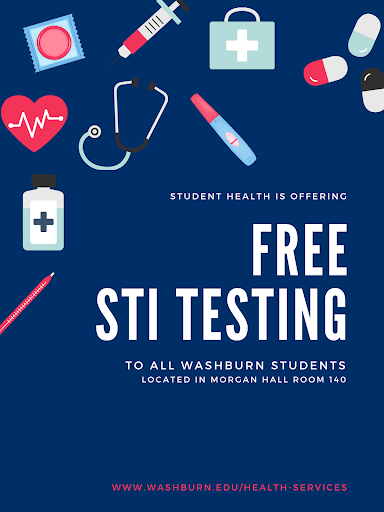Student Health offers free STI testing to students

Student Health will be offering free STI testing to students while supplies last.
Sex can be a hard topic for people to talk about, and for some it never gets easier. Therefore, being educated on sexual health and infections is important for people who are sexually active. On a college campus, one in four students are reported to have had a sexually transmitted infection. These infections have always had a negative stigma in the media, although anyone who is sexually active can get them.
Student Health is currently offering free STI testing for chlamydia and gonorrhea to all Washburn students while supplies last. Washburn Student Government Association purchased 75 test vouchers this semester for students, and they are planning on purchasing additional tests for the spring semester.
At Student Health, confidentiality is the main priority and they hold faculty and staff members to that standard. Tiffany McManis, director of Student Health Services and nurse practitioner, encourages students to advocate for their own health – whether it be physical, emotional or mental – and take advantage of the services Student Health offers.
“It’s always good to know your status and good to save money; we know students aren’t rolling in excess cash,” said McManis. “Even if you are, that doesn’t mean you want to spend it on testing, so take advantage of these resources provided for you.”
Chlamydia and gonorrhea are the most common STIs people get tested for and also happen to be the two tests that are free at Student Health. What makes infections like chlamydia and gonorrhea tricky is that 90% of people who are infected show no symptoms. Because these infections are easier to spread, they are commonly found on college campuses. The earlier an STI is discovered, the earlier the treatment process can begin for students. Although most infections are not curable (like herpes, HIV, HPV and hepatitis B), all can be treated with medications that Student Health provides.
Untreated STIs can cause serious health problems, like infertility in cases involving chlamydia and gonorrhea. College-aged students are stastically more at risk for catching a sexually transmitted infection, so it is important for them to advocate for their own health and get tested. If a person is sexually active, catching a sexual infection can be a risk. Taking advantage of free STI testing is beneficial for everyone.
Although many people can feel embarrassed about getting tested, it can only benefit everyone involved. Getting tested for an STI shows respect for yourself as well as your partner. For sexually active people, not only could they be at risk, but their partner can be at risk too. Open communication is the best bet when breaking the news to involved parties. Although it’s uncomfortable, it is important to respect yourself and your partner by getting tested.
Kennedy Blome, junior in nursing, volunteered at Student Health earlier this semester where she administered free flu vaccines to the student body. She believes that Washburn has a great health organization on campus that offers significant opportunities for students to prioritize their health. Blome and McManis both agree that student’s health should be at the forefront of their priorities.
“I feel like I should emphasize that you should not be embarrassed to get checked for STIs; it’s crucial to make sure your health is in order,” Blome said.
For students who are feeling unsure, it is important to remember the benefits of being tested regularly when sexually active. Taking preventive action in response to an STI is the most important thing to do. The STI test is fast, easy and free for Washburn students.
“If you dont feel comfortable talking about sexually transmitted infections, then you probably shouldn’t be having sex,” McManis said.
The only way to remove the negative stigma and keep yourself and others safe is to take preventive action and make time to get tested. Sex is a choice, along with staying healthy. Prioritizing your health and making sure you are safe is the only thing necessary for sexually active students.
Edited by Simran Shrestha, Glorianna Noland
Your donation will support the student journalists of Washburn University. Your contribution will allow us to purchase equipment and cover our annual website hosting costs.









